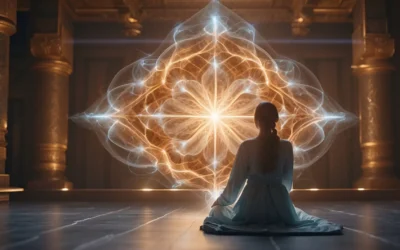Did you know that studies show 80% of illnesses are stress-related? Embracing the ancient art of Reiki healing might just be the key to unlocking a healthier, more balanced life. Imagine tapping into universal energy to promote relaxation, reduce pain, and enhance overall well-being.
Reiki healing is a form of energy healing that involves the transfer of universal life force energy through the hands of a practitioner to promote physical, emotional, and spiritual well-being.
With its gentle yet potent approach, Reiki aims to harmonize mind, body, and spirit, fostering a sense of inner peace and vitality.
Are you ready to explore this natural healing method that has been practiced for centuries? Let’s delve into the transformative world of Reiki together.
Energy Healing Explained
Principles of Energy Healing
Energy healing is a holistic practice that focuses on restoring the body’s natural energy balance. It operates on the principle that life force energy flows through all living beings, impacting physical, emotional, and mental well-being. By channeling this energy, practitioners aim to promote healing and alleviate various ailments.
Understanding Energy Fields
At the core of energy therapy are energy fields, subtle vibrations surrounding and interpenetrating the human body. These fields contain vital information about an individual’s health and can reflect imbalances before they manifest as physical symptoms. By working with these fields, practitioners specializing in energy healing can identify and address issues at their energy source.
History and Origins of Energy Healing
The roots of spiritual healing practices date back thousands of years across cultures worldwide. From Ancient Chinese Qi Gong to Indian Ayurveda and Japanese Reiki, natural healing modalities have evolved. The concept of tapping into universal life force energy to restore harmony within the body has been a common thread throughout history.
How Reiki Works
Universal Energy
Reiki harnesses universal energy to promote healing, flowing through the practitioner’s hands into the recipient’s body. This energy is not limited by time or space, aiding in physical and emotional well-being.
Practitioner’s Role
Reiki practitioners act as conduits, guiding the energy to where it is needed most in the recipient’s body. Through gentle touch or hovering motions, they facilitate the flow of energy, promoting relaxation and stress reduction.
Chakras and Balance
Reiki focuses on chakras, the body’s energy centers, aiming to balance them for overall well-being. By clearing blockages and enhancing energy flow within these chakras, Reiki helps restore harmony and vitality.
Incorporating Reiki into holistic practices can enhance traditional medical treatments, offering a complementary approach to healing. The gentle nature of Reiki makes it suitable for individuals of all ages and conditions, providing a soothing experience that promotes relaxation and inner peace.
Benefits of Reiki Healing
Physical Benefits
Reiki healing promotes pain reduction by stimulating the body’s natural healing process. It induces deep relaxation, aiding in overall well-being.
Reiki sessions can lead to improved sleep quality and enhanced energy levels, contributing to a sense of vitality and rejuvenation.
Emotional and Mental Benefits
Benefit from Reiki includes stress relief through the release of emotional blockages, fostering a sense of calmness and mental clarity.
Receiving Reiki treatment can help in achieving emotional balance, reducing anxiety, and enhancing emotional resilience.
Spiritual Benefits
Reiki therapy facilitates increased intuition by promoting a deeper connection with one’s spiritual self. It enhances self-awareness and mindfulness.
Engaging in Reiki practices can foster a sense of inner peace, spiritual growth, and alignment with one’s higher purpose.
Reiki for Pain Relief
Alleviating Physical Pain
Reiki, a form of energy healing, targets physical discomfort by promoting relaxation and reducing stress levels. Through gentle touch on specific areas, it can help alleviate various types of pain, such as muscle soreness or tension headaches. The therapeutic techniques used in Reiki work to address the root cause of the pain, providing symptom relief.
Managing Chronic Conditions
For individuals dealing with chronic pain conditions like arthritis or fibromyalgia, Reiki offers a holistic approach to managing their symptoms. By facilitating deep relaxation and restoring balance within the body’s energy centers, Reiki can provide long-lasting relief from persistent discomfort. Patients often report feeling a sense of ease and reduced pain intensity after Reiki sessions.
Supporting Studies and Testimonials
Studies have shown that Reiki can significantly reduce pain levels in patients undergoing medical treatments or recovering from surgery. Many individuals have shared their positive experiences with Reiki, highlighting its ability to promote better sleep quality, enhance overall well-being, and complement traditional medical treatments effectively.
Reiki and Mental Health
Anxiety Relief
Reiki can help reduce anxiety by promoting relaxation through gentle touch and energy transfer. This practice calms the mind and induces a sense of peace, easing anxious thoughts.
Emotional Well-being
For those struggling with depression, Reiki healing offers emotional support by balancing the body’s energy flow. Clients often report feeling lighter and more positive after sessions.
Resilience Boost
Reiki therapy enhances resilience by harmonizing the body’s energy centers, fostering a sense of inner strength. This increased resilience helps individuals cope better with life’s challenges.
Mental Clarity
Through its calming effects on the nervous system, Reiki treatment clears mental fog and enhances focus. Clients often experience improved clarity of thought and decision-making skills.
Understanding Reiki Sessions
What Happens
During a Reiki session, the practitioner will gently place their hands on or above specific areas of the client’s body. Energy flows through the practitioner to the recipient, promoting relaxation and stress reduction.
Clients often experience sensations such as warmth, tingling, or deep relaxation during the session. The practitioner may focus on balancing the client’s energy centers, known as chakras, to enhance overall well-being.
Importance of Intention Setting and Relaxation
Intention setting plays a crucial role in Reiki sessions. By setting a clear intention for healing or specific outcomes, the energy flow becomes focused and purposeful. This enhances the effectiveness of the session and helps address emotional or physical issues.
Creating a calming environment and promoting relaxation are essential aspects of Reiki. Deep relaxation allows the body to enter a state where natural healing can occur more effectively. Clients often report feeling lighter, calmer, and more balanced after a session.
Post-Session Experiences and Self-Care
After a Reiki session, clients may experience various responses such as heightened emotions, increased energy levels, or profound insights. It is important to drink plenty of water to help flush out toxins released during the session.
Engaging in self-care practices like meditation, gentle exercise, or spending time in nature can further enhance the benefits of Reiki sessions. These practices help maintain balance and continue the healing process initiated during the session.
Effectiveness of Reiki Healing
Scientific Evidence
Reiki has shown significant improvement in reducing pain, anxiety, and depression according to various studies. Research indicates that Reiki can increase relaxation and improve overall well-being.
Comparison with Conventional Treatments
In certain conditions like chronic pain and stress-related disorders, Reiki outcomes have been comparable to or even better than conventional medical treatments. Patients often report feeling more relaxed and experiencing less pain after Reiki sessions.
Debunking Misconceptions
Despite common misconceptions labeling Reiki as pseudoscience, evidence-based research supports its benefits. Studies have demonstrated the positive impact of Reiki on physical and mental health, emphasizing its role as a complementary therapy alongside conventional medicine.
Final Remarks
You’ve delved into the realm of energy healing through Reiki, understanding its workings, benefits, and effectiveness. Now equipped with insights into how Reiki can alleviate pain, support mental well-being, and enhance overall health, you hold the key to exploring this holistic practice further. Whether seeking relief from physical discomfort or aiming to balance your emotional state, Reiki offers a gentle yet powerful approach worth considering.
Take the next step by experiencing a Reiki session firsthand. Embrace the opportunity to tap into your body’s natural healing abilities and restore harmony within. Your journey towards holistic wellness awaits—immerse yourself in the soothing energy of Reiki and unlock a path towards rejuvenation and balance.
Frequently Asked Questions
How does Reiki healing work?
Reiki is a Japanese technique that channels energy to activate the natural healing processes of the body. Practitioners use hands-on or hands-off techniques to promote relaxation, reduce stress, and restore balance in the body’s energy flow.
What are the benefits of Reiki healing?
Reiki can help reduce anxiety, improve sleep quality, relieve pain, enhance emotional well-being, and boost overall energy levels. It complements traditional medical treatments and promotes holistic healing by addressing physical, emotional, mental, and spiritual aspects.
Is Reiki effective for pain relief?
Yes, Reiki has been shown to be effective in reducing pain levels by promoting relaxation and releasing tension in the body. It can help manage chronic pain conditions and support the body’s natural ability to heal itself.
How does Reiki impact mental health?
Reiki can have a positive impact on mental health by reducing symptoms of depression and anxiety, promoting relaxation, improving mood, and enhancing overall emotional well-being. It helps create a sense of inner peace and balance in times of stress or emotional turmoil.
What happens during a Reiki session?
During a Reiki session, you will typically lie down or sit comfortably while the practitioner places their hands lightly on or above your body in different positions. You may experience sensations of warmth, tingling, or deep relaxation as the energy flows through you.
Is Reiki healing considered effective?
While individual experiences may vary, many people report feeling calmer, more balanced, and experiencing relief from various physical or emotional issues after Reiki sessions. Research studies have also shown promising results in supporting the effectiveness of Reiki as a complementary therapy.











